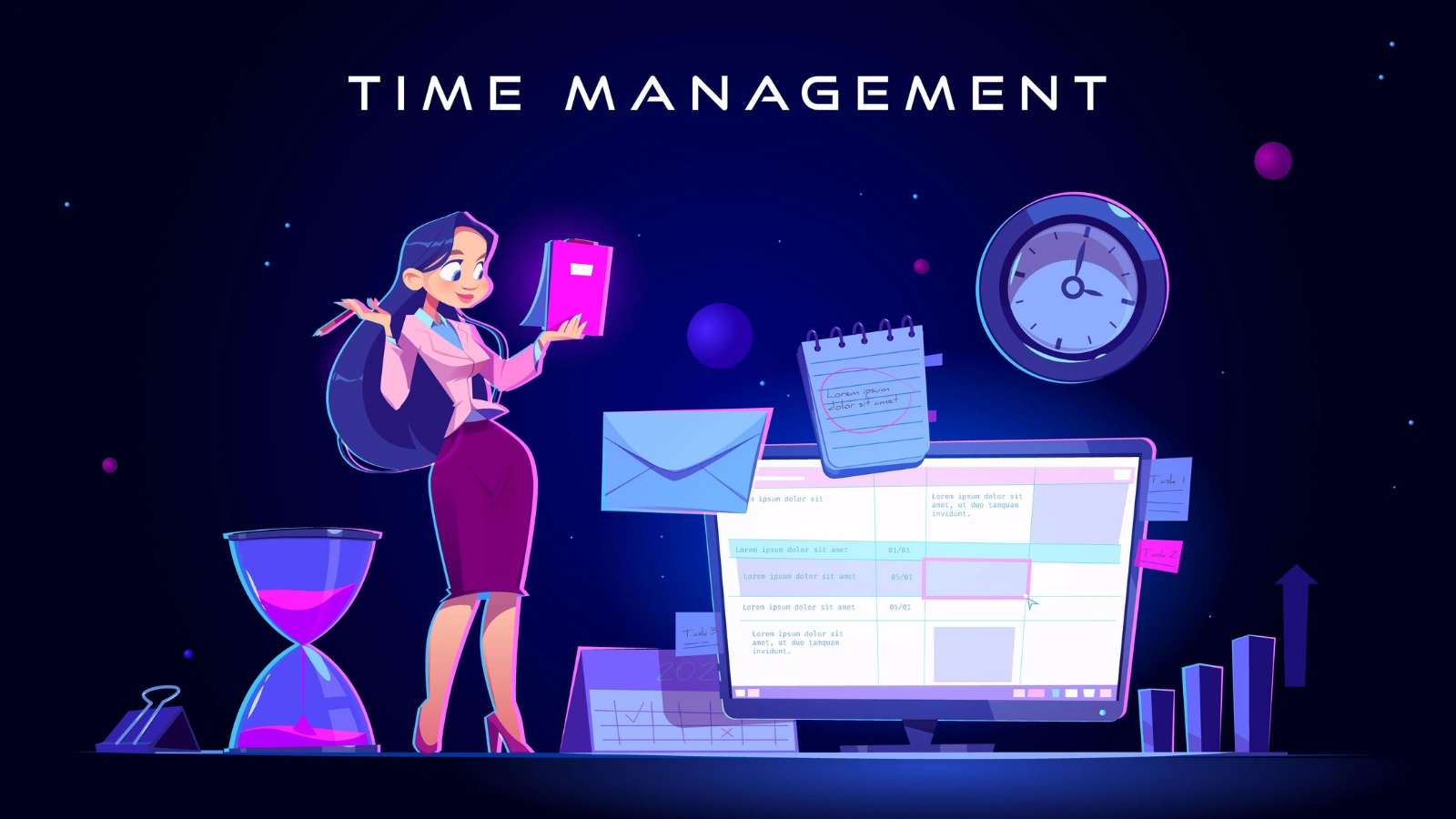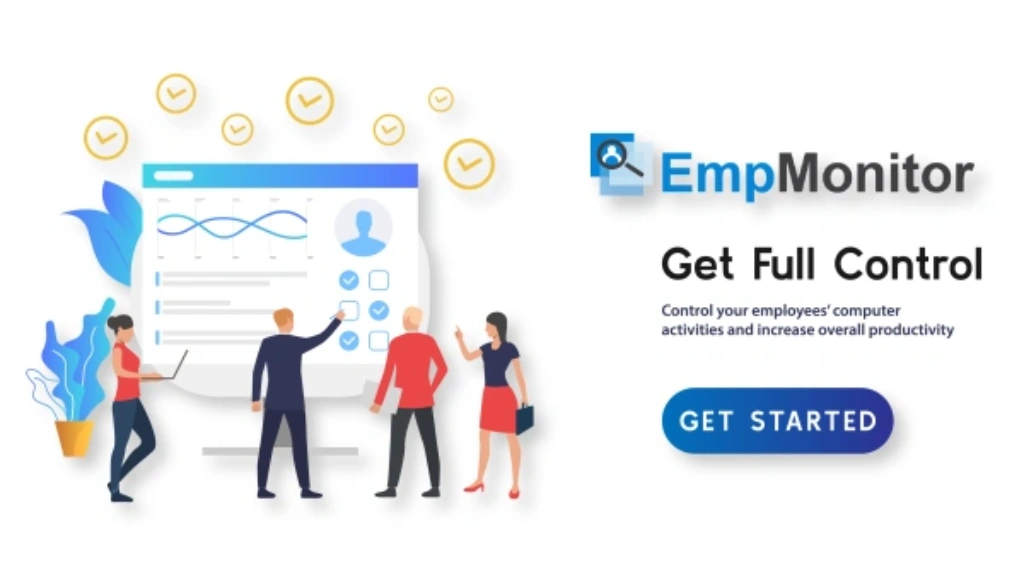Do you ever feel like the day slips away before you can catch up? With meetings, deadlines, personal commitments, and a growing to-do list, time management can quickly become an overwhelming challenge. Whether you’re a student trying to stay ahead, a working professional balancing tasks, or a business owner looking to streamline operations, learning how to manage time well can make all the difference.
In this blog, we’ll explore practical time management techniques, why they matter, and how the right tools can help you take control of your day.
Listen To The Podcast Now!
Why Learning How To Manage Time Matters?
Time is one of our most limited resources. When not managed well, it can result in increased stress, lost opportunities, and decreased productivity. However, learning how to manage time empowers you to prioritize, focus, and achieve your goals more efficiently.
Some benefits of good time management include:
Boosts Productivity and Efficiency:
Understanding how to manage time allows you to prioritize tasks effectively, avoid distractions, and focus on what truly matters. This leads to getting more done in less time without compromising quality.
Improves Work-Life Balance:
When your schedule is well-structured, you can allocate time not just for work, but also for rest, hobbies, and personal commitments. Good time management ensures that neither your career nor your personal life has to suffer.
Lowers Stress and Anxiety:
Last-minute scrambles and missed deadlines often lead to burnout. Knowing how to manage time helps you stay ahead of tasks, reducing mental fatigue and daily pressure.
Enhances Deadline Management:
When your day is organized, it’s easier to track progress, set realistic goals, and meet deadlines consistently, whether you’re handling a solo project or collaborating with a team.
Leads to Greater Satisfaction and Growth:
Mastering how to manage your time not only brings a sense of control and accomplishment but also opens up opportunities for learning, growth, and achieving long-term goals. Ultimately, learning how to manage time is the foundation for both personal fulfillment and professional success.
In short, when you truly understand how to manage time and apply it consistently, you not only improve your productivity but also elevate your overall work management approach, setting yourself up for a more focused, balanced, and fulfilling life, both personally and professionally.
What Are The Most Proven Time Management Techniques?
Mastering how to manage time effectively starts with applying tested strategies that help you plan, focus, and execute your daily responsibilities effectively. Below are five highly effective techniques to improve your time management game:
1. The Eisenhower Matrix:
This classic decision-making tool helps you prioritize tasks by categorizing them based on urgency and importance. Tasks are divided into four quadrants: those that are both urgent and important (which require immediate attention), those that are important but not urgent (which should be scheduled), those that are urgent but not important (which can often be delegated), and those that are neither urgent nor important (which can usually be eliminated).
By visualizing your tasks in this way, you gain clarity on where to focus your efforts and learn how to manage time more effectively by avoiding distractions and low-value activities.
2. Time Blocking:
Time blocking is a proactive scheduling method where you divide your day into dedicated segments for specific tasks or types of work, such as meetings, creative work, admin tasks, or even breaks. Instead of reacting to tasks as they arise, you control your schedule by setting aside focused time for everything that matters.
This approach significantly reduces distractions, prevents multitasking, and enhances concentration, making it a powerful technique for those looking to improve how to manage time in a structured and efficient way.
3. Pomodoro Technique:
The Pomodoro Technique is a time management strategy designed to enhance focus and prevent burnout. It involves working in short, timed intervals, typically 25 minutes of deep work followed by a 5-minute break. After completing four such cycles, you take a longer break to recharge.
This method helps maintain high levels of mental energy throughout the day and promotes consistent productivity. It’s especially useful for people who struggle with attention span or feel overwhelmed by large tasks, offering a simple yet powerful way to manage their time more intentionally.
4. SMART Goal Setting
SMART goal setting brings clarity and direction to your efforts by ensuring each goal you set is Specific, Measurable, Achievable, Relevant, and Time-bound. Instead of vague ambitions, you create clear objectives that are easier to plan and track.
This method helps align your daily activities with long-term results, eliminating guesswork and keeping you focused. By breaking big visions into practical steps, SMART goals make it easier to stay motivated and organized as you learn how to manage time with purpose and precision.
5. Task Batching:
Task batching is a time management strategy where you group similar activities and complete them within a set time block, instead of spreading them out over the day. For example, you might dedicate one block of time solely to replying to emails, another for making phone calls, and a separate slot for content creation.
This method reduces the mental strain caused by constantly switching between different types of tasks, a phenomenon known as context switching. By minimizing interruptions and maintaining a consistent focus, task batching helps you streamline your workflow and significantly improve how to manage time more efficiently.
Task batching is one of the most effective ways to streamline daily work and reduce overwhelm, making it an ideal strategy for anyone looking to learn how to manage time better in fast-paced environments.
Also Read:
Why Should Effective Time Management Be Used Routinely?
Work Management Made Easy: Tips and Tricks for a Productive Day
How Can You Manage Time Effectively At Work Using Professional Best Practices?
In a busy professional environment, learning how to manage time efficiently is crucial to staying productive without feeling overwhelmed. These best practices are designed to help you take control of your workday, prioritize tasks, and maintain consistent progress:
Start with a Structured Morning Routine:
Your morning sets the tone for the rest of your workday. Instead of jumping straight into emails or calls, begin with a few minutes to plan your priorities. Review your calendar, identify top tasks, and mentally prepare for the day ahead.
Creating a morning routine helps you enter the day with intention rather than reaction, which is one of the foundational steps in learning how to manage your time efficiently.
Prioritize Using Tiered To-Do Lists:
Breaking down your goals into actionable steps is key to staying productive. Organize your tasks by day, week, and month so that you always know what needs immediate attention versus what can be planned.
Prioritizing based on importance and deadlines ensures your focus stays on high-impact work, not just busy work. A clear list keeps your mind uncluttered and helps guide daily decisions.
Limit Meetings to What’s Essential:
Meetings often consume hours of the workweek, and many of them don’t add value. Be selective about the meetings you attend, make sure there’s a clear purpose, a time limit, and defined action points. When meetings are unavoidable, use agendas and summaries to keep them productive.
Protecting your schedule from excessive meetings is a critical part of mastering how to manage time in a professional setting.
Automate and Delegate Repetitive Tasks:
Repetitive tasks such as responding to routine emails, updating reports, or scheduling appointments can eat up a significant portion of your day. Use automation tools and time tracking software to handle these responsibilities efficiently. These tools help monitor repetitive tasks, minimize manual effort, and ensure accurate time allocation for more strategic work.
Also, don’t hesitate to delegate tasks to others on your team when appropriate. Freeing yourself from low-value tasks allows you to focus on work that aligns with your core goals and responsibilities.
Conduct Weekly Progress Reviews:
Make it a habit to pause at the end of each week and reflect on your progress. What did you achieve? What took longer than expected? What could you improve next week? This review process not only boosts accountability but also reveals patterns in your productivity.
Regular reflection is one of the best ways to continuously refine how you manage your time at work and ensure your efforts stay aligned with your priorities.
By adopting these professional best practices, you create a structured, purposeful work routine that supports both personal effectiveness and team success. Ultimately, understanding how to manage time at work empowers you to be more productive, less reactive, and better equipped to meet your goals, no matter how demanding your role may be.
Also Read:
What Are The Most Common Time Management Challenges People Face?
Before you can master how to manage time, it’s important to recognize the common obstacles that get in the way. These challenges often go unnoticed but can significantly affect your productivity, focus, and overall well-being.
Let’s break down some of the most frequent time management issues and why they matter:
Procrastination:
Delaying important tasks is one of the biggest barriers to effective time management. While it may offer short-term relief, procrastination often leads to last-minute rushes, increased stress, and lower-quality output. Over time, it becomes a habit that erodes your confidence and disrupts your workflow.
Poor Planning:
Without a clear roadmap for the day or week, it’s easy to lose sight of what matters. Poor planning leads to reactive work habits, missed deadlines, and a constant feeling of being behind. Structuring your time with defined goals and priorities is essential to gaining control over your schedule.
Distractions:
Modern workspaces, both digital and physical, are full of distractions. Frequent notifications, social media distractions, unplanned calls, and pointless meetings can break your focus and consume precious time. Learning how to manage time includes creating boundaries around your focus and reducing interruptions wherever possible.
Multitasking:
Though often praised as a skill, multitasking can reduce your efficiency and accuracy. Switching between tasks takes a toll on cognitive energy, slows down performance, and increases the risk of errors. Focusing on one task at a time is not only faster but also leads to better outcomes.
Lack of Boundaries:
Saying yes to every request, whether from coworkers, clients, or even yourself, can quickly overload your calendar. Without setting clear boundaries, your time gets consumed by other people’s priorities, leaving little space for your own. Learning how to manage your time also means learning when and how to say no.
Understanding these challenges helps you improve how to manage time and take back control of your day.
How To Manage Your Time With Digital Tools?
Digital tools are the backbone of modern time management. From calendar apps to project management systems, they provide the structure, visibility, and accountability needed to stay organized and focused throughout the day. While traditional time management techniques are useful, consistently applying them can be challenging without the right kind of support.
This is where a tool like EmpMonitor can make a real difference. Designed to bring clarity to how time is spent, it not only boosts individual focus but also enhances employee productivity across teams. By offering real-time data and insights, EmpMonitor helps individuals and organizations build more productive habits without disrupting the natural flow of work.
What Makes EmpMonitor An Ideal Tool For Managing Time Tracking And Productivity?
EmpMonitor offers a focused set of features that support practical time management for individuals and teams. It goes beyond basic tracking to provide insights and tools that directly enhance daily productivity and workflow efficiency. Here are six features that stand out:
Time Tracking:
EmpMonitor delivers detailed, real-time timesheets that accurately capture work hours and activity levels. This visibility allows users to understand how their time is spent throughout the day, helping identify patterns, reduce time leaks, and improve overall accountability. It’s a key step toward developing better time management habits.
Productivity Reports:
The platform generates daily, weekly, and monthly productivity reports that offer a clear snapshot of individual and team performance. These reports help managers spot trends, evaluate effectiveness, and make informed decisions about task prioritization and workload distribution.
Distraction Analysis:
By tracking app and website usage, EmpMonitor reveals how much time is spent on non-work-related activities. This insight is valuable for reducing distractions, staying focused, and learning how to manage time more effectively, especially when working remotely or in environments with frequent interruptions.
Attendance and Work Hour Monitoring:
EmpMonitor simplifies attendance tracking by automatically logging login, logout, break times, and leave details. This eliminates the need for manual entries and supports accurate time records, making it easier to maintain structure and punctuality across the team.
Project and Task Monitoring:
With built-in project tracking tools, teams can monitor progress in real-time, assign tasks, and check on deadlines, all from one dashboard. This feature promotes collaboration, ensures transparency, and keeps everyone aligned on project goals and timelines.
Real-Time Activity Monitoring:
EmpMonitor continuously tracks user activity to identify peak productivity hours and inactive periods. This helps individuals plan their schedules more effectively and enables managers to support their team with better timing and task allocation.
Together, these features make EmpMonitor a practical solution for anyone looking to improve how they manage time, whether individually or across an entire team.
What Should You Look For In The Best Time Management Tools?
To manage time better, you need the right tech stack. Whether you’re searching for time tracking tools, project management platforms, or performance dashboards, make sure your tools:
- Integrate seamlessly
- Offer real-time insights
- Are user-friendly
- Scale with your team
EmpMonitor checks all these boxes, making it a reliable solution for both individuals and enterprises aiming to optimize how they manage time.
Conclusion
Managing time effectively isn’t just about squeezing more tasks into your day; it’s about focusing on what truly matters and making your time count. Whether you’re aiming to meet deadlines, reduce stress, or strike a better work-life balance, strong time management skills are key.
By combining smart habits with practical strategies and the right digital support, you can gain more control, clarity, and confidence in how you approach each day. If you’re ready to improve the way you work and live, give EmpMonitor a try. It helps turn your time management goals into real, lasting results.
FAQs
1. How can time management impact mental health?
Ans. Learning how to manage time effectively can significantly reduce stress and prevent burnout. When you take control of your schedule, it improves focus, builds confidence, and supports better mental well-being.
2. What’s the difference between time blocking and task batching?
Ans. Time blocking assigns chunks of time to different types of work, while task batching groups similar tasks together to reduce context switching.
3. How do I stick to my time management routine long-term?
Ans. Start small, track your progress, adjust regularly, and use tools that support consistency to turn time management into a sustainable habit.
















